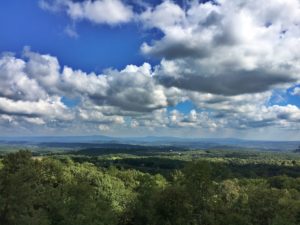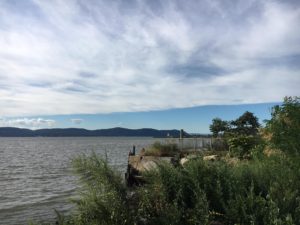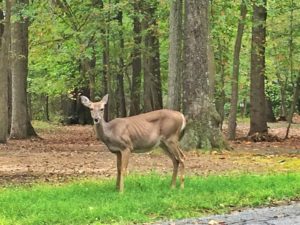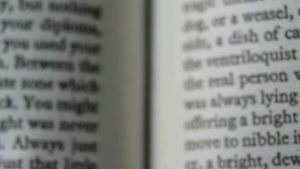
Image description: a photo of the Mason Dixon line from about 20 miles away, taken by Sparrow Rose Jones at the Maryland/Pennsylvania border near Clear Spring, Maryland on October 4, 2016
This is a re-blog of a post originally made on January 2, 2013. It has been slightly edited for grammar, clarity, and availability of external links, but not for content.
Autistic Inertia: An Overview
I was talking with my boyfriend yesterday about autistic inertia. I was describing how it affects me and bemoaning the fact that it’s so clearly a real thing that exists but I never see researchers or educators talking about it — just us Autistics. We know it exists, we know it’s a real thing, but it’s not in the official literature and no one is researching it.
After I described it a bit, my boyfriend remarked upon how similar it sounds to what people with Parkinson’s experience. Upon reflection, that didn’t surprise me too much since Parkinson’s is linked to dopamine and I’ve read autism research that talks about irregularities in dopamine and seratonin in the autistic brain. He did a little searching and found a study using Parkinson’s medications on autistic people that reported little improvement. But he also remarked that if the researchers weren’t specifically looking for improvement in autistic inertia, they may have missed some of the effects of the medication.
I promised my boyfriend that I would send him some links to things fellow Autistics have written about autistic inertia. At the same time, I realized it’s been a while since I updated my blog and so I thought I would just share the information here in case it’s helpful to more people than just myself and my amazing boyfriend who is always so willing to go out of his way to understand me better.
The first thing I ever read about autistic inertia was Anna Sullivan’s handout from her presentation at Autreat 2002: Inertia: From Theory to Praxis. Sullivan talks about the different manifestations of inertia and her descriptions make it clear that inertia is not one single thing. From what I can see, there are elements of executive dysfunction, of low energy/hypotonia, and of being out of touch with one’s body and emotions. And this is just the beginning, from what I can tell. One thing Sullivan doesn’t mention, though, is the idea that inertia is a difficulty in “changing gears.” You will see the professionals talking about “gear changing” issues sometimes and that’s a part of inertia, although not all of it.
Also, Sullivan doesn’t mention that inertia in autistics is not dissimilar to Newton’s inertia, in that not only do we have difficulty starting things if we’re stopped but we also have difficulty in stopping things if we’re started. As I told my boyfriend yesterday, when I start researching for a paper, I have a hard time stopping the research and starting the writing. So I will end up with enough research material for seven papers before I ever manage to make myself stop researching and start organizing my material and writing it out. It does mean that my papers tend to be really good since I know far more than I end up putting in writing. But it also means that it doesn’t matter how early I manage to start working on a paper, I will always be scrambling to finish it at the last minute.
Something very important that Sullivan points out is the unevenness of skill sets in autistics. That is, an autistic person might be able to do something easily one day but run up against severe inertia with the same task on another day. Autism isn’t something constant and steady-state but rather something variable, more like multiple sclerosis, fibromyalgia, or lupus. What we can do one day, we can’t do every day. What we can’t do one day, we might be able to do on another. This, in my experience, has been one of the hardest things for people around me to grasp. People seem to expect some sort of constancy and consistency in the people around them and I’m just not able to provide that steady, constant level of skill and ability. Some days I easily “pass” for non-autistic while other days I am quite obviously Autistic, no matter who you ask.
Sullivan ends with a suggested reading list. Since the article is older, one item on the list might be supplanted with a newer book. Sullivan lists “Punished by Rewards” by Alfie Kohn but I might recommend also reading (or reading instead) “Drive: The Surprising Truth About What Motivates Us” by Daniel H. Pink.
Sullivan mentions a posting from Kalen and it’s really good so it should be on the to-read list as well: Inertia: by Kalen. Kalen writes about inertia from a more Newtonian perspective, including both getting stuck within a task as well as getting stuck trying to do a task. Kalen also mentions how disabling inertia can be in a person’s life. It was a relief for me to read someone else describing inertia that way because it has certainly prevented me from doing many things I really wanted to do and it’s hard not to feel lazy or inadequate about one’s own inertia without the proper understanding of what it really is and what it really means.
Kalen describes inertia as “a combination of attention shifting and motor planning difficulties” which definitely resonates with my experience. There are times when I am only able to act by willing my body to perform and just as many times when I cannot get my body to perform, no matter how much will I exert. When I lose the ability to speak, I can think about the sounds that I want to create. I can think about the ways my mouth and throat and lungs move when I generate those sounds. But I cannot will my body to speak. It is as baffling to me as it is to those around me, but I can think the words — I can even type the words — but I cannot speak the words when I am in a state of “speaking inertia.” Just as there are times when those around me feel I might never shut up, there are times when it seems I might never speak again.
Kalen offers a few suggestions for how to work with or around inertia, warning that not all suggestions will work for all people, nor will a suggestion that works sometimes for someone work every time or in every situation for that person.
Aspergia Jones writes about the idea that autistic “special interests” might actually be a form of inertia in her blog entry on her site, Letters from Aspergia. She talks about inertia as a sort of “stuckness” and mentions how much more we Autistics tend to get overtaken by “ear worms” — music stuck in the head. Or movies stuck in the head. Or anything stuck in the head. I have gotten stuck on a word or phrase and ended up repeating it over and over. In my opinion, yes, “stuckness” is inertia, whether it’s being stuck on a special interest or stuck on song lyrics or just stuck.
In the original version of this blog post, Aspergia Jones posted a comment:
Thanks for the link! You’re right, very very little is written about autistic inertia, even though it really is A Thing – personally, it can be more disabling than the social stuff. I think the research tends to concentrate on the things about autism that are a problem for or seem weird to neurotypical folk, like stimming and differences in social interaction. Things that affect us deeply but don’t affect those around us – like sensory/motor stuff and inertia – get a lot less press.
Although, just as with every other aspect of autism, it is easy to assume that all difficulties trace back to an autistic trait even when they don’t. On LiveJournal, ChaoticIdealism writes about Autistic Inertia & Sleep in a way that makes it clear to me that they are living with Non-24-Hour Sleep-Wake Disorder and assuming it’s actually a manifestation of autistic inertia. I can really relate to that since I originally thought that my own Non-24 Disorder was actually Autistic Burn-out. (That’s a whole different blog entry, but you can read about autistic burnout in Amanda Baggs’ excellent essay Help! I seem to be Getting More Autistic!)
Ali/Eliot writes about inertia and perseveration as two sides of the same coin in his blog entry, Stare Up at the Sky. He talks about how difficult it can be to make decisions — everything from big decisions like buying a new laptop to little decisions like what to eat for lunch. He talks a bit about how his partner, Kitty, does thing to make it easier for him to eat regularly and make other decisions.
This blog entry is no longer available. In the original post of this blog entry, Ali wrote a comment:
The post you’re referencing of mine is a couple of years old, and my thoughts haven’t drastically changed so much as refined a little. Inertia and choice paralysis (which isn’t a term I used in that entry but I think is self explanatory?) also happen for people who are perfectionists–and I’m that, too. The basis is entirely different, at least in me. Autistic inertia is most of what I listed in the post originally: needing external or internal prompting to begin or end a task (or part of a task), where task is a value-neutral word for any possible thing you could be doing. The perfectionist inertia is more about the choice paralysis: you can’t pick which option because one of them will be the wrong option or at least not optimal, so until you have all the data ever you’re stuck. I think my long example in the post about laptop purchasing is actually more related to perfectionism than to autism.
There’s overlap between the two, but thinking about them as separate things has helped me sort out what I can consciously change (the perfectionist stuff) and what I can’t or find very difficult to change (like remembering to eat if I’m distracted). And it’s been almost like there’s inertia about my inertia: when I can handle the perfectionist stuff, it makes it easier to brain together some of the physical inertia or get the song I’ve had stuck for over a week out of my head.
Andrea has a few tips on how to battle inertia in her blog entry Coping With the Inertia of Task Paralysis. But, as a commenter points out: “Great ideas, Andrea, but how the heck am I going to remember to do all that? I have a hard enough time remembering to remember and now I’m supposed to remember the reminders for remembering? Help! I’m trapped in an infinite regress!”
I’m sure there is much more out there on autistic inertia, but the above is a fair introduction to the topic. Please do discuss this in the comments! I really want to hear from anyone and everyone about inertia, whether it’s personal experiences or scientific (or even pseudo-scientific) theories. This is a topic that needs to be understood much better than it is and right now we are the ones hashing the ideas out. It’s up to us to figure out what’s going on and what to do about it.
Thanks for reading and I look forward to hearing from you all!






Recent Comments